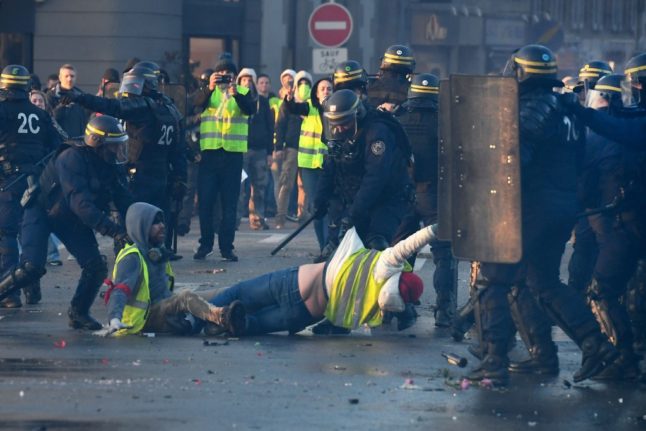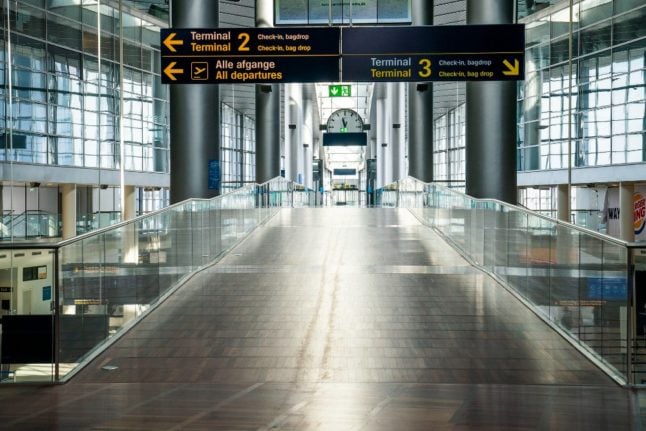What is the bill?
The proposed law, Loi relative à la sécurité globale (law on global security) is a major piece of security legislation covering issues regarding policing in France, several of which have drawn criticism.
Most controversial is the bill's clause 24, which would criminalise the publishing of any photos or videos where a police officer or gendarme could be recognised, if there is an intent to harm their “physical or psychological integrity”.
Article 24 bans “disseminating, by any means or medium whatsoever, with the aim of harming their physical or mental integrity, the image of the face or any other identifying element of an officer of the national police or member of the national gendarmerie when acting during a police operation.”
Offenders would risk one year in prison and a €45,000 fine.
The bill was later amended to include a precision that the intent to harm must be “manifest” and that the law should not interfere with press freedom.
READ ALSO Seven times videos revealed police violence in France
Is the bill likely to become law?
So far, the bill is just a proposal and must pass through both the French Parliament Assemblée Nationale and the Senate before becoming law.
It was proposed on October 20th by MPs from two parliamentary groups, ruling party La République en Marche and Agir ensemble, which is a group consisting of UDI MPs and independent MPs.
It's similar to a bill that came before the parliament in the spring, which failed to pass, but this time it has been backed by the Interior Minister Gérald Darmanin.
“My job as interior minister is to protect those who protect us,” Darmanin told BFMTV.
“I had made a promise, that it would no longer be possible to broadcast the image of the police and gendarmes on social media. That promise will be kept,” the interior minister said.
The bill is scheduled to be debated in the French parliament on November 17th.

'Justice for Adama' (Traoré) echoed from the mouths of thousands of protesters during France's Black Lives Matter movement this spring, calling for truth on the young man who died at the hands of French police a few years back. Photo: AFP
What's the problem with the bill?
Critics, including Reporters Without Borders (RSF), Amnesty, the United Nations and France’s human right’s defender, say the bill could have dangerous democratic consequences.
If adapted in its current form, the law “would endanger journalists and press freedom”, RSF said.
Article 24 of the bill is problematic because intent is “open to interpretation and hard to determine”, they said.
While the bill would not outright ban filming or photographing a police officer, the wording left it up to the police to determine whether the person holding the camera was manifesting malicious intent. In the heat of the moment, that could lead to grave misjudgements, RSF said.
“When a journalist is filming them, police officers might assume that the video is being broadcast live with the aim to harm them and they could arrest the journalist,” said RSF spokesperson Pauline Ades-Mevel. “Even if the likelihood of conviction was low, the detained journalist would have been prevented from continuing to cover what was happening.”
In other words, the damage would already have been done.
A Le Monde editorial expressed the same worry: “By fear of conviction, the media may refrain from broadcasting images of incidents with police officers.”
Amnesty International France too condemned the principle of intent as too vague, telling Europe 1 it opened for “arbitrary” interpretations.
Journalist Guillaume Bernard, who covers social movements for French media Rapports de Force, said he would think twice before pointing his camera lens towards a police officer the next time he was covering a protest, if the law were adopted.
“There will always be this fear that if you include a police officer in your frame, they might put pressure on you to lower your phone or say you don’t have the right to film, even if you’re just doing your job,” he told The Local.
In October 2019, Bernard was arrested during a ‘yellow vest’ protest in Toulouse he covered as a freelance journalist. After 24 hours and consistent pressure from several press groups, Bernard was released without charges.
“The reality is that journalists are under pressure from police already. This law will make the whole thing even more ambiguous: who will determine whether there is a desire to harm the police?” Bernard said now.

French police officers protested the government's attempt to ban a controversial “chokehold” detainment technic in the wake of the death of Black American George Floyd at the hands of US police, which sparked calls on stricter rules for policing in France. Outraged police threw their handcuffs on the ground. Photo: AFP
'This is terrible censorship'
But journalists were not the only ones who would be affected by the law, said David Dufresne, a French author and filmmaker who has covered police violence for decades.
“Regular citizens are those who really will suffer,” Dufresne told The Local. “This is censorship, terrible censorship.”
Dufresne’s latest film, Un pays qui se tient sage, is a documentary based on a collection of amateur footage captured by ‘yellow vests’ during the months of protests in 2019, which sparked a nationwide debate on police violence in France.
“My film may not have been possible under this law,” he said, adding: “These images are key for victims of injustices to seek justice. There is no democracy without checks and balances.”
READ ALSO How the 'yellow vests' made France have a national conversation about police violence

A protester kicks back a tear gas can in Nantes on August 3rd, 2019, during a protest in the memory of Steve, a young man who drowned in the Loire river during a police raid of a music festival. Photo: AFP
Is this type of footage important?
Amateur footage, often shot on camera phones, has led to important discoveries regarding police violence such as when Ladj Ly, the later creator of the Oscar-nominated film Les Misérables, captured on camera the arrest of 20-year-old Abdoulaye Fofana, in Montfermeil, an impoverished part of the Parisian suburb Seine-Saint-Denis.
Police accused Fofana of having thrown cobblestones and shot fireworks at a police car together with others in the neighbourhood, but avoided including their own violent beatings of the young man during the arrest – including pointing a gun at him while handcuffed – which Ly's video revealed. That was back in 2008, France's first police violence case sparked by an amateur video, but one of many more to come.
Several videos shot during the 'yellow vest' protests also showed violent behaviour from police, some of which has lead to criminal charges.
So why is the law being proposed?
The government has fiercely defended the bill, claiming it is a necessary means to clamp down on violent acts directed at the country's police officers.
In 2019, the year of the 'yellow vest' spring riots, police officers filed 38,519 complaints about violence, up by 18 percent compared to 2017, before the movement started.
France has also seen several incidents where police officers and their families have been attacked or threatened in retaliation.
Police say the past year's massive upsurge in online footage of police on duty is making it easier for those aiming to harm to identify them and have welcomed the law proposal as long overdue.
“Videos showing the faces of police officers put them and their families at risk of retaliation,” Denis Jacob, General Secretary of the union Alternative Police told BFMTV.
“Wives of officers have been assaulted in the past as a result of videos being shown. Families should not be afraid of having a police officer among them,” Jacob said.
READ ALSO OPINION: French police are not just thugs, they are being placed in an impossible situation
Frédéric Lagache, the Deputy General Secretary of the national police union ALLIANCE denied that the bill went too far in restraining freedom of expression. Rather, he told The Local, the bill did not go far enough.
“By the time the decision is taken it will be too late, the images will already be circulating on social media,” he said.
“Our problem is not with journalists, it's with social media. Videos should not be published online, they should be taken in front of a public court.
“That said, if the choice is between press freedom and the security of my colleagues, I choose the security of my colleagues.”



 Please whitelist us to continue reading.
Please whitelist us to continue reading.
If this bill became law in the U.S., Police would still be killing unarmed black people with immunity. The public would still believe fraudulent cover stories concocted to cover murders carried out in darkness. People would believe that George Floyd and Eric Garner were killed by police defending themselves. This is a terrible law. I hope France rejects it. n
I have every sympathy with the police who are often severly tested but this proposed piece of law is unworkable in any fair way and will likely be missused 99% of the time. It should have NO place in a free and democratic country. The Deputy General Secretary of the national police union ALLIANCE is quoted as ” …, if the choice is between press freedom and the security of my colleagues, I choose the security of my colleagues.” Well that’s his job, but it speaks volumes about the attitudes prevalent in the police forces.
I think that people should have no fear, restriction or danger about filming police, but potentially should consider blurring faces before uploading video to social media. The current culture of doxxing IS actually dangerous.
The police have very dangerous jobs. They are there to protect us. Police also must be protected too. And we need to help them stay safe too. Filming police to cause harm to them must be banned.
I am totally against this becoming law. Some of the police in this country are violent and arrogant. If they behave within the law, then they have nothing to worry about if we film them.